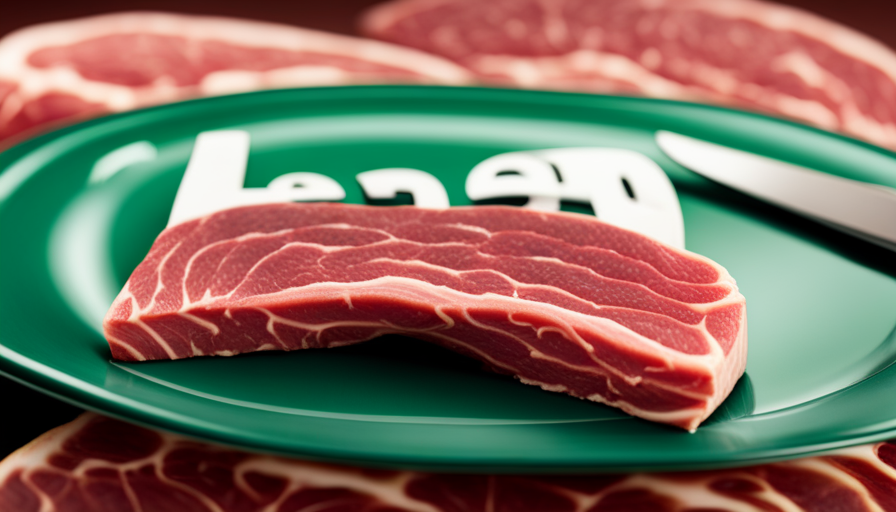Picture yourself at the meat section of your neighborhood supermarket, looking for the right piece of beef to cook for dinner. While you browse through the choices, you come across a package marked ‘lean beef.’ But what exactly does that signify? What distinguishes lean beef from other cuts?
In the world of food labels, the term ‘lean’ holds a specific significance, indicating a lower fat content and a healthier option for weight management. But there’s more to it than just that.
In this article, we will explore the definition of ‘lean’ in the context of food labels, uncover the nutritional benefits of lean beef, discuss its role in heart health, share tips for choosing lean beef cuts, and explore various cooking methods.
So, if you’re ready to enhance your understanding of lean beef and its place in a healthy diet, let’s dive in!
Key Takeaways
- Lean beef is a healthier option for meals as it has low fat content and meets specific criteria for labeling as ‘lean.’
- Lean beef provides essential nutrients like lean protein, iron, zinc, and B vitamins, supporting overall health.
- Cooking methods like grilling, broiling, and roasting can retain nutrients while minimizing fat content in lean beef.
- Including lean beef in the diet can help with weight management, reduce the risk of obesity, and support cardiovascular well-being.
Definition of ‘Lean’ in the Context of Food Labels
If you’re wondering what the word ‘lean’ means on that package of raw beef, let me tell you, it’s a label that indicates the meat has a low fat content, making it a healthier option for your meals.
In the context of food labeling, ‘lean’ refers to the amount of fat present in a particular food item. For beef, to be labeled as ‘lean,’ it must have less than 10 grams of total fat, 4.5 grams or less of saturated fat, and less than 95 milligrams of cholesterol per 100 grams of meat. This definition ensures that the beef is a good source of lean protein without contributing excessive fat or cholesterol to your diet.
This definition ensures that the beef is a good source of lean protein without contributing excessive fat or cholesterol to your diet. Including lean protein in a balanced diet is important for several reasons. Protein is an essential nutrient that plays a crucial role in building and repairing tissues, as well as supporting various physiological functions.
Lean protein, such as that found in lean beef, provides all the necessary amino acids needed for these processes without the added burden of excessive fat. Additionally, incorporating lean protein into your meals can help you feel fuller for longer, which may aid in weight management.
Now that we understand the definition of ‘lean’ in the context of food labeling and the importance of lean protein in a balanced diet, let’s explore the nutritional benefits of lean beef.
Nutritional Benefits of Lean Beef
There are several nutritional benefits associated with choosing lean beef, such as its ability to provide essential vitamins and minerals, support muscle growth, and aid in weight management. Lean beef is not only a great source of high-quality protein, but it also contains important nutrients like iron, zinc, and B vitamins.
These nutrients are crucial for maintaining overall health and well-being. Incorporating lean beef into your diet can have positive effects on muscle tone and energy levels. A study conducted on a group of individuals who included lean beef in their meals found that they experienced improved muscle tone and increased energy throughout the day. This can be attributed to the high protein content in lean beef, which helps in repairing and building muscle tissues.
Cooking techniques also play a role in maximizing the nutritional value of lean beef. It is important to choose cooking methods that retain the nutrients while minimizing fat content. Grilling, broiling, and roasting are recommended as they allow excess fat to drip away, resulting in a leaner final product.
Transitioning to the subsequent section about the lower fat content in lean beef, it is important to understand how this aspect contributes to its overall nutritional benefits.
Lower Fat Content in Lean Beef
To fully appreciate the nutritional benefits of lean beef, you’ll be amazed by how its lower fat content can enhance both the taste and health benefits of your meals.
Lean beef is a great choice for those looking to reduce their calorie intake while still enjoying a delicious and satisfying meal. With its lower fat content, lean beef can help you maintain a healthy weight and support your weight management goals.
One of the key advantages of lean beef is that it provides all the essential nutrients your body needs without the extra calories from fat. This means that you can enjoy a hearty and nutritious meal without worrying about consuming excessive calories.
Lean beef is also a versatile ingredient that can be used in a variety of delicious recipes. From lean beef stir-fry to lean beef chili, there are endless possibilities to incorporate this lean protein into your diet.
In addition to being lower in calories, lean beef also offers a wide range of health benefits. It’s a rich source of high-quality protein, which is essential for building and repairing tissues in the body. Protein also helps to keep you feeling full and satisfied, making it an excellent choice for those looking to manage their weight.
The lower fat content in lean beef makes it a healthier option for weight management. By choosing lean beef and incorporating it into your meals, you can enjoy the taste and nutritional benefits without compromising your health goals.
Healthier Option for Weight Management
You’ll be amazed at how lean beef can help you achieve your weight management goals while still indulging in flavorful and satisfying meals. Choosing lean beef as a healthier option can be beneficial for weight management due to its lower fat content.
By reducing the fat intake, you can lower the overall calorie intake, which is crucial for maintaining a healthy weight. Lean beef is a great source of protein, which is essential for building and repairing tissues in the body. It also helps in increasing satiety, making you feel fuller for longer periods of time.
Additionally, lean beef contains important nutrients like iron, zinc, and B vitamins, which are necessary for overall health and well-being.
When it comes to weight management, it is important to consider the health risks associated with certain food choices. Lean beef provides a healthier alternative to fattier cuts of meat, which can increase the risk of obesity, heart disease, and other health issues. By incorporating lean beef into your diet, you can enjoy delicious meals while minimizing these risks.
To make the most of lean beef, there are numerous recipes available that can help you create nutritious and flavorful dishes. From lean beef stir-fries to lean beef chili, there are plenty of options to choose from. These recipes often include a variety of vegetables and spices, adding both taste and nutritional value to your meals.
Lean beef is a great option for weight management as it offers a lower fat content and a range of important nutrients. By incorporating lean beef into your diet and exploring various lean beef recipes, you can enjoy delicious meals while taking care of your health.
Transitioning into the next section about lean beef and heart health, it is important to note that lean beef can also have positive effects on cardiovascular well-being.
Lean Beef and Heart Health
Lean beef can be a heart-healthy choice that supports cardiovascular well-being. When it comes to lean beef nutrition, it’s important to know that it’s low in saturated fat and cholesterol, both of which are associated with an increased risk of heart disease.
Incorporating lean beef into your diet can provide you with essential nutrients like iron, zinc, and B vitamins, which are important for overall health.
Here are four reasons why lean beef is good for your heart:
- Lean beef is a great source of high-quality protein, which plays a crucial role in maintaining a healthy heart.
- It contains omega-3 fatty acids, which’ve been shown to reduce inflammation and promote heart health.
- Lean beef is rich in antioxidants, such as vitamin E and selenium, which help protect the heart from oxidative stress.
- Including lean beef in your diet can help you maintain a healthy weight, which’s important for heart health.
In addition to its heart-healthy benefits, lean beef is also versatile and can be incorporated into a variety of delicious recipes. From lean beef stir-fry to lean beef tacos, there’re endless possibilities to enjoy this nutritious protein source.
Transitioning into the subsequent section about protein content in lean beef, it’s important to understand how this nutrient contributes to its overall health benefits.
Protein Content in Lean Beef
When it comes to lean beef and heart health, it’s crucial to consider the protein content. Lean beef is an excellent source of high-quality protein, which is essential for maintaining and repairing body tissues. Protein also plays a vital role in promoting satiety and muscle growth.
In fact, a 3-ounce serving of lean beef can provide around 25 grams of protein, making it an ideal choice for those looking to meet their daily protein needs.
Not only does lean beef offer a substantial protein content, but it also comes with numerous nutritional benefits. It’s packed with essential nutrients like iron, zinc, and B-vitamins, which contribute to optimal health and well-being. These nutrients are crucial for energy production, immune function, and brain health.
Incorporating lean beef into your diet can be a smart choice for overall nutrition. However, it’s important to choose the right cuts of lean beef to maximize the benefits.
In the next section, I’ll provide tips for selecting lean beef cuts that are lower in fat and calories. Transitioning into the subsequent section, let’s explore "tips for choosing lean beef cuts" to make informed dietary choices.
Tips for Choosing Lean Beef Cuts
Get ready to sink your teeth into some mouthwatering advice on how to choose the juiciest, most flavorful cuts of lean beef! When it comes to selecting the perfect lean beef, it’s important to consider both its nutritional value and the cooking techniques that’ll bring out its best flavors.
Here are four essential tips to keep in mind:
-
Look for cuts labeled ‘loin’ or ’round’: These cuts of beef are naturally leaner and have less fat marbling, making them a healthy choice. They’re also packed with essential nutrients like protein, iron, and zinc.
-
Opt for grass-fed beef: Grass-fed beef isn’t only leaner but also higher in omega-3 fatty acids and antioxidants, which offer numerous health benefits. Additionally, it tends to have a richer, more robust flavor.
-
Choose lean cuts with minimal visible fat: Trim any excess fat before cooking, as it can add unnecessary calories. Lean cuts like sirloin, tenderloin, and eye of round are excellent options.
-
Consider the cooking method: Lean beef is best when cooked using moist heat methods, such as braising or slow cooking, to keep it tender and juicy. These cooking techniques break down the collagen in the meat, resulting in a more flavorful and tender dish.
Now that you know how to choose the perfect lean beef cuts, it’s time to explore the various cooking methods that’ll make your dishes even more delectable.
Cooking Methods for Lean Beef
When it comes to cooking lean beef, it’s important to choose the right cooking methods to ensure that the meat stays tender and flavorful. There are several techniques that work well with lean beef, such as grilling, broiling, and stir-frying. These methods allow the meat to cook quickly at high temperatures, which helps to retain its natural juices and flavors.
Grilling is a popular choice for lean beef cuts because it adds a smoky flavor and creates a delicious char on the outside. Broiling is another great option, as it cooks the meat quickly under intense heat, resulting in a crispy exterior and a juicy interior. Stir-frying is perfect for thinly sliced lean beef, as it cooks the meat rapidly over high heat, locking in its natural flavors.
When it comes to lean beef recipes, there are endless possibilities. From hearty stews to flavorful stir-fries, there’s something for everyone. Some popular recipes include lean beef chili, beef and vegetable stir-fry, and grilled beef skewers.
In the next section, we will discuss other considerations when purchasing lean beef, including the importance of checking for quality and freshness.
Other Considerations When Purchasing Lean Beef
Another important factor to consider when buying lean beef is ensuring that it’s of high quality and freshness. To make an informed decision, there are a few nutritional considerations and taste preferences to keep in mind.
-
Nutritional considerations: When purchasing lean beef, it’s essential to look for cuts that are low in fat and cholesterol. This’ll help maintain a healthy diet and prevent the risk of heart disease. Additionally, lean beef is an excellent source of protein, iron, and essential vitamins and minerals. Choosing lean cuts ensures that you’re getting these nutrients without the excess fat.
-
Taste preferences: While nutritional content is vital, taste preferences also play a role in selecting lean beef. Different cuts have varying levels of tenderness and flavor. Some individuals prefer lean cuts that’re more tender and less chewy, while others may enjoy the robust flavor of cuts with a higher fat content. It’s essential to consider your personal taste preferences when purchasing lean beef.
When buying lean beef, it’s crucial to consider both nutritional aspects and personal taste preferences. By selecting high-quality, fresh cuts that align with your dietary needs and desired flavors, you can incorporate lean beef into a healthy diet seamlessly.
Conclusion: Incorporating Lean Beef into a Healthy Diet
To truly transform your diet and achieve optimal health, it’s time to unlock the nutritional powerhouse that’s lean beef. Incorporating lean beef into a healthy diet can provide numerous nutritional benefits that contribute to overall well-being.
Lean beef is an excellent source of high-quality protein, essential amino acids, vitamins, and minerals. It’s also low in saturated fats and cholesterol, making it a heart-healthy choice.
When it comes to protein, lean beef is a top contender. It not only provides all nine essential amino acids but also contains them in optimal proportions for our body’s needs. This makes it a complete protein source, essential for muscle growth, repair, and maintenance.
In addition to protein, lean beef is packed with essential vitamins and minerals. It’s an excellent source of iron, zinc, selenium, and B vitamins, including vitamin B12. These nutrients play crucial roles in energy metabolism, immune function, and brain health.
Incorporating lean beef into your diet can also aid in weight management. Protein-rich foods like lean beef help increase satiety, keeping you feeling full and satisfied for longer periods. This can prevent overeating and contribute to weight loss or maintenance.
Lean beef offers a wide array of nutritional benefits that make it a valuable addition to a healthy diet. By incorporating lean beef into your meals, you can reap the rewards of its high protein content, essential nutrients, and potential weight management benefits. So, why not give lean beef a try and enjoy its delicious flavor and health benefits today?
Frequently Asked Questions
How is the term ‘lean’ defined in relation to food labels for raw beef?
The term ‘lean’ on a food label for raw beef refers to the amount of fat present in the meat. In relation to food labels, ‘lean’ is defined as having less than 10 grams of total fat, 4.5 grams or less of saturated fat, and less than 95 milligrams of cholesterol per serving.
Including lean beef in a balanced diet is important as it provides essential nutrients like protein, iron, and zinc while minimizing unhealthy fats.
What are the nutritional benefits of consuming lean beef?
Nutritional value and lean meat are synonymous when it comes to beef. Eating lean beef offers numerous benefits. It is an excellent source of high-quality protein, essential amino acids, vitamins B6 and B12, and minerals like iron and zinc.
The low-fat content in lean beef aids in maintaining a healthy weight and supports cardiovascular health. Moreover, lean beef is a valuable source of conjugated linoleic acid (CLA), which has been associated with various health benefits, including reduced inflammation and improved body composition.
How does lean beef contribute to weight management and a healthier diet?
Lean beef is an excellent choice for weight management and a healthier diet due to its high protein content. Protein is a key nutrient for weight loss as it helps to increase satiety, reduce cravings, and promote muscle growth and repair.
Additionally, lean beef is low in calories and saturated fat, making it a nutritious option for those looking to maintain a healthy weight. Incorporating lean beef into your diet can provide the necessary nutrients for a balanced and effective weight loss plan.
Is lean beef beneficial for heart health?
Lean beef is indeed beneficial for heart health. Research has consistently shown that consuming lean beef as part of a balanced diet can help reduce the risk of heart disease. This is because lean beef is low in saturated fat and cholesterol, which are known to contribute to heart problems.
Additionally, lean beef is a good source of protein, iron, zinc, and B vitamins, all of which are important for maintaining a healthy cardiovascular system.
How does the protein content in lean beef compare to other types of meat?
Compared to other types of meat, lean beef has a higher protein content, making it a great choice for those looking to increase their protein intake. Protein is essential for various bodily functions and can aid in muscle growth and repair.
In addition to its protein content, lean beef also provides other nutritional benefits, such as iron and vitamin B12. Incorporating lean beef into a balanced diet can support overall health and well-being.
Is Honey Considered a Lean Food Option Like Raw Beef?
Honey is not classified as a lean food option like raw beef by the FDA. While it is a natural sweetener, it is not a part of the lean protein food group. However, it can still be enjoyed in moderation as a part of a balanced diet.
Conclusion
In conclusion, incorporating lean beef into a healthy diet can have numerous benefits. Not only does it provide essential nutrients and proteins, but it also helps in weight management and contributes to heart health. Choosing lean beef cuts and using appropriate cooking methods can further enhance its nutritional value.
Just like a well-oiled machine, lean beef fuels our body with the right amount of fuel, keeping it running smoothly and efficiently. So, let’s embrace the lean and enjoy the benefits it brings to our overall well-being.










